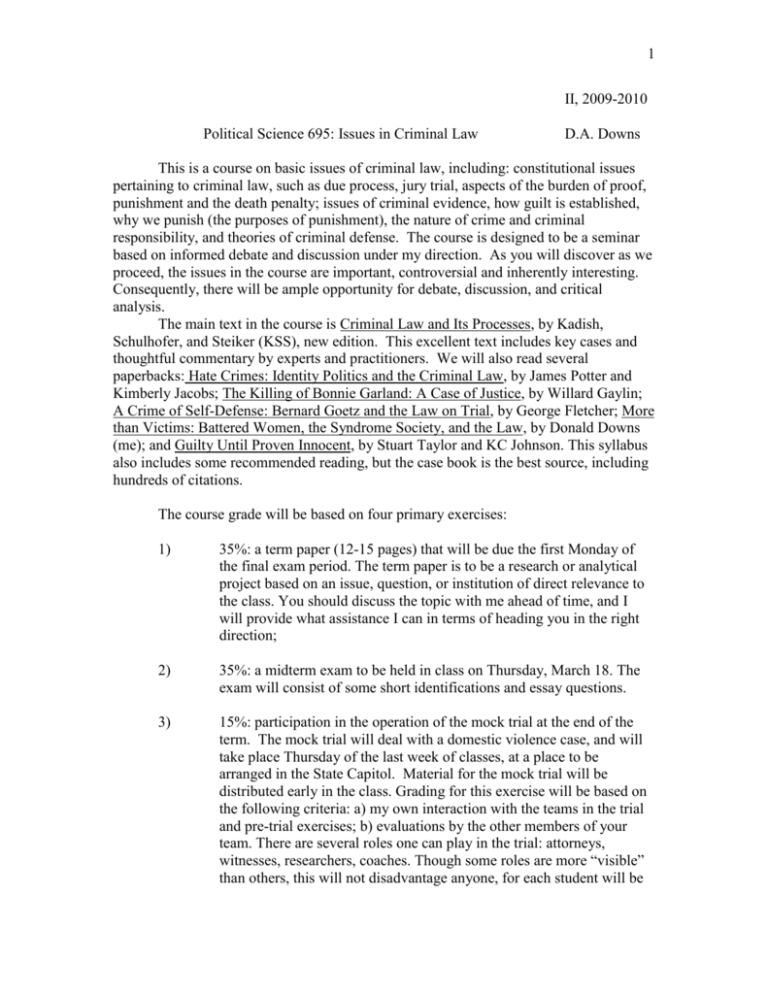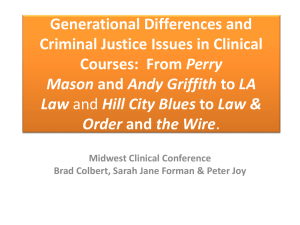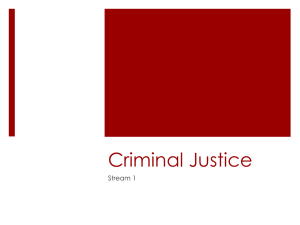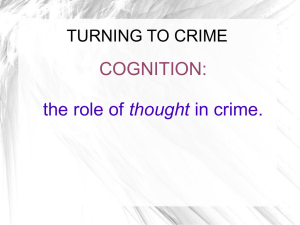PS 695 002 Issues in Criminal Law
advertisement

1 II, 2009-2010 Political Science 695: Issues in Criminal Law D.A. Downs This is a course on basic issues of criminal law, including: constitutional issues pertaining to criminal law, such as due process, jury trial, aspects of the burden of proof, punishment and the death penalty; issues of criminal evidence, how guilt is established, why we punish (the purposes of punishment), the nature of crime and criminal responsibility, and theories of criminal defense. The course is designed to be a seminar based on informed debate and discussion under my direction. As you will discover as we proceed, the issues in the course are important, controversial and inherently interesting. Consequently, there will be ample opportunity for debate, discussion, and critical analysis. The main text in the course is Criminal Law and Its Processes, by Kadish, Schulhofer, and Steiker (KSS), new edition. This excellent text includes key cases and thoughtful commentary by experts and practitioners. We will also read several paperbacks: Hate Crimes: Identity Politics and the Criminal Law, by James Potter and Kimberly Jacobs; The Killing of Bonnie Garland: A Case of Justice, by Willard Gaylin; A Crime of Self-Defense: Bernard Goetz and the Law on Trial, by George Fletcher; More than Victims: Battered Women, the Syndrome Society, and the Law, by Donald Downs (me); and Guilty Until Proven Innocent, by Stuart Taylor and KC Johnson. This syllabus also includes some recommended reading, but the case book is the best source, including hundreds of citations. The course grade will be based on four primary exercises: 1) 35%: a term paper (12-15 pages) that will be due the first Monday of the final exam period. The term paper is to be a research or analytical project based on an issue, question, or institution of direct relevance to the class. You should discuss the topic with me ahead of time, and I will provide what assistance I can in terms of heading you in the right direction; 2) 35%: a midterm exam to be held in class on Thursday, March 18. The exam will consist of some short identifications and essay questions. 3) 15%: participation in the operation of the mock trial at the end of the term. The mock trial will deal with a domestic violence case, and will take place Thursday of the last week of classes, at a place to be arranged in the State Capitol. Material for the mock trial will be distributed early in the class. Grading for this exercise will be based on the following criteria: a) my own interaction with the teams in the trial and pre-trial exercises; b) evaluations by the other members of your team. There are several roles one can play in the trial: attorneys, witnesses, researchers, coaches. Though some roles are more “visible” than others, this will not disadvantage anyone, for each student will be 2 graded solely on the basis of how well he or she performs in his role and how well she contributes to the overall effort of the team. 4) 15%: class participation. The class will be very much debate and discussion driven, so good class participation (which consists of quality more than quantity) will be rewarded. Those who choose to be listeners more than discussants will not be penalized for this (good listeners help every discussion), and their grades will be based simply on how they perform in the three categories above. Those who do well in class discussions will be rewarded, however. During the course of the term, you will also be asked at various points to prepare a short, one-page essay about a key matter under discussion, and to defend that position during part of the class period. Thus, sometimes class discussion will be directed and set up, while at other times it will be more open-ended. The typical class will consist of my setting up the issues through lecture, and ensuing class debate and discussion. The pace with which we will proceed will depend upon the nature of the materials and the discussions. I will keep you posted as we proceed. I. Introduction. Basic Issues of the Criminal Process and Evidence, Constitutional Law Issues, and Legal Ethics. KSS, Ch. 1. Taylor and Johnson, Guilty Until Proven Innocent Recommended: William T. Pizzi, Trials Without Truth, Chs. 1-5. On reserve in Helen C. White. II. Punishment. Reasons for Punishment, and Moral and Constitutional Issues. KSS, Ch. 2; Ch. 5, pp. 466-508. Jacobs and Potter, Hate Crimes. III. The Basic Elements of Criminal Responsibility. KSS, Ch. 3, pp. 182-248; (248-290); 133-82 IV. Attempts and the Significance of Resulting Harm. KSS, Ch. 6, pp. 544-588. V. Homicide. KSS, Ch. 5, pp. 373-466. VI. Exculpation. A. Justifications: Self-Defense, Lesser Evil, Necessity, Duress, etc. Self-Defense, Lesser Evil, Necessity, etc. KSS, Ch. 8, pp. 737-821. 3 Fletcher, A Crime of Self-Defense. Downs, More than Victims, Chs. 1, 5-8. Recommended: Walker, Terrifying Love. B. Excuses: Intoxication, Mental Disorder, Incapacity, etc. K&S, Ch. 8, pp. 831-932. Gaylin, The Killing of Bonnie Garland. Some Recommended Works (See KSS for more specific issue areas) -Akhil Reed Amar, The Constitution and Criminal Procedure: First Principles (1997) -Liva Baker, Miranda: Crime, Law, and Politics (1983) -K. Bartlett, “Feminist Jurisprudence,” 1990 Harvard Law Review -Jessica Benjamin, The Bonds of Love: Psychoanalysis, Feminism, and the Problem of Domination (1988) -Mirjan R. Damaska, The Faces of Justice and State Authority (1986) -Richard Delgado, “’Rotten Social Background’: Should the Criminal Law Recognize a Defense of Severe Environmental Deprivation?” 1985 Law and Inequality -P. Devlin, The Enforcement of Morals (1965) -Donald Downs, The New Politics of Pornography (1989) -Phil Fennel, Criminal Justice in Europe (1995) -George P. Fletcher, Rethinking Criminal Law (1978); With Justice for Some (1995); “The Individualization of Excusing Conditions,” 1974 Southern California Law Review -Michel Foucault, Discipline and Punish (1979) -Jerome Frank, Courts on Trial (1949) -Marvn Frankel, Partisan Justice (1980) -David Garland, Punishment in Modern Society: A Study in Social Theory (1990) -Kent Greenawalt, Speech, Crime, and the Uses of Language (1989) -H.L.A. Hart, Punishment and Responsibility (1868) -Richard Herrnstein and James Q. Wilson, Crime and Human Nature (1985) -Jerome Hall, General Principles of Criminal Law (1960) -Jack Katz, Seductions of Crime: Moral and Sensual Attractions in Doing Evil (1988) -Leo Katz, Bad Acts and Guilty Minds: The Conundrums of Criminal Law (1988) -M. Kelman, “Interpretive Construction in the Substantive Criminal Law,” 1981 Stanford Law Review -W. LaFave and A. Scott, Criminal Law (2d. Edition and updates) -Catharine MacKinnon, “Feminism, Marxism, Method, and the State: Toward a Feminist Jurisprudence,” 1983 Sings; “Toward Feminist Jurisprudence,” 1982 Standord Law Review -David McCord, “Syndromes, Profiles, and Other Mental Exotica: A New Approach to the Admissability of Nontraditional Psychological Evidence in Criminal Cases,” 1987 Oregon Law Review -Michael Moore, Law and Psychiatry: Reexaming the Relationship (1984) -Herbert Packer, The Limits of the Criminal Sanction (1968) -Steven Philips, No Heroes, No Villains: The Story of a Murder Trial (1978) 4 -Jeffrey Rosen, The Unwanted Gaze: The Destruction of Privacy in America (2000) -Elizabeth Schneider, Battered Women and Feminist Lawmaking (2000) -Elaine Showalter, Hystories: Hysterical Epidemics and Modern Media (1997) -David Simon, The Killing Streets (1991) -W. Simon, “The Ethics of Criminal Defense,” 1993 Michigan Law Review (see also 1992 symposium in 1992 Notre Dame Law Review) -Bruce Springsteen, Nebraska (1982) -Franklin Strier, Reconstructing Justice: An Agenda for Trial Reform (1994) -J. Stephen, A History of the Criminal Law in England (1883) -Thomas Szasz, The Myth of Mental Illness (1974), and other works by Szasz -Barbara Wooten, Crime and the Criminal Law (1963)









